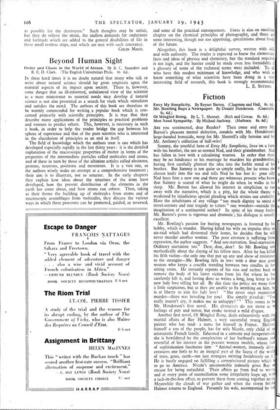Fiction
Envy My Simplicity. By Reyner Barton. (Chapman and Hall. 8s. 6d., Mr. Bowling Buys a Newspaper. By Donald Henderson. (Constable 8s. 6d.)
Of Mingled Being. By L. 1. Shorter. (Rich and Cowan. 8s. 6c1.) Men Need Sympathy. By Michael Anthony. (Methuen 8s. 6d.) ARE you sentimental, dear Reader? Then come and envy Mr. Barton's pleasant mental defective, condole with Mr. Henderson's large-handed homicide, weep for Mr. Shortell's silly heroine and for Mr. Anthony's collection of half-wits! Sammy, the youthful hero of Entry My Simplicity; livesrozra farm with his brother, the not so normal Ned, and their grandmother. Ned has fallen in love with a calculating wanton. In order that there may be no hindrance to his marriage he murders his grandmother, having first carefully planted the idea into the feeble mind of his brother. But Sammy is not quite so simple really, for he tosses the chosen knife into the sea and tells Ned he has lost it: poor silly Ned buys him a new one and there are witnesses present who know that Sammy is scared of what he might do when he walks in his sleep. Mr. Barton has allowed his interest in simplicism to run away with the narrative, which is a pity, for the whole theme is weakened by injudicious special pleading which strains our credulity. Have the inhabitants of any village " too much dignity to stand at street-corners and tear tragedy to tatters " one wonders—outside the imagination of a sentimental author? In spite of his many faults, Mr. Barton's prose is vigorous and dramatic ; his dialogue is usually excellent.
Mr. Bowling's passion for buying newspapers is fostered by his hobby, which is murder. Having killed his wife on impulse after an air-raid which had destroyed their home, he decides that he will never murder another woman. The poor creature is suffering from repression, the author suggests. " And sex-starvation. Soul-starvation. Ordinary starvation too." Dear, dear, dear! So Mr. Bowling sets methodically about the slaying of his fellow men. After he has killed his fifth victim—the only one that put up any real. show of resistance to the strangler—Mr. Bowling falls in love with a dear nice good woman who keeps a crucifix standing between two candles in her sitting room. He instantly repents of his sins and rushes back to remove the body of his latest victim from his flat where he has carelessly left it, and having done so writes a long, long letter to his new lady love telling her all. By this time the police are more than a little suspicious, but as they are unable to fix anything on him, he is at liberty to join his lady love! " She never once mentioned murder—there was breeding for you! She simply pleaded: `You really mustn't cry, it makes me so unhappy! ' " This seems to be Mr. Henderson's first novel. His characters do not move us t feelings of pity and terror, but evoke instead a mild disgust. Another first novel, Of ifingled Being, deals exhaustively with th marital affairs of Ray Halmer, a very successful young Englis painter who has made a name for himself in France. Halmer himself a son of the people, has for wife Nicole, only child of an aristocratic French family. Educated in a convent and inexperienced she is bewildered by the complexities of her husband's nature an resentful of his interest in the peasant women models, whose lack of sophistication fascinates him " Animal-women, intensely alive creatures one feels to be an integral part of the fauna of the worl of trees, grass, earth—not just strangers existing fastidiously on it. He is busily engaged on fulfilling a commissioned picture which to go to America. Nicole's unreasonable jealously gives Ray excuse for being unfaithful. 'Their affairs go from bad to worF° and at every point of reconciliation some irregularity leaps up, wi a jack-in-the-box effect, to prevent them from coming together agai Meanwhile the clouds of war gather and when the storm brew Halmer returns to England. Presently his wife, accompanied by h
mother, appears on the scene ; quite soon all their differences are
• resolved and all is well. This highly coloured novel is written with cheerful gusto, but the characters have no depth and their fates remain a matter of indifference, as do- those of Mr. Anthony, in his first novel, Men Need Sympathy, a light-hearted affair about a middle-class English family of mediocrities, the Jocelyns. Papa is a stupid tyrant, suffering from self-importance and indigestion. Mama is equally stupid, for in spite of the fact that she has a grown-up son and daughter, she knows so little about her husband's character that he is enabled to thrOw her into a state of acute despair by a cock-and-bull story concerning the state of his health. While in London for the purpose of seeing a specialist Mr. Jocelyn encounters a dashing adventuress. She is later killed by her con- federate. Mr. Jocelyn, convinced that his neck is in danger, flies. He is eventually found by his daughter's young man, who restores him to his family. Mr. Anthony has a facetious careless style: " She was wearing a black dress surmounted by a worried look." JoHN HAmpsom. JoHN HAmpsom.



























 Previous page
Previous page